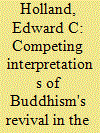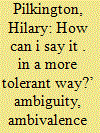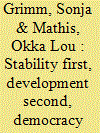| Srl | Item |
| 1 |
ID:
140435


|
|
|
|
|
| Summary/Abstract |
This article uses a multiple methods framework to interrogate notions of religious revival among Buddhists in the Russian republic of Kalmykia. Survey results indicate high levels of self-identification among Kalmyks as Buddhists, as well as general support for the notion that the religion has re-established its place in the public sphere in the post-Soviet period. This straightforward interpretation of religious revival is contested, however, in interviews with religious elites and focus group conversations. Interlocutors in these forums were more critical and more nuanced in their understanding of Buddhism's role in contemporary Kalmykia.
|
|
|
|
|
|
|
|
|
|
|
|
|
|
|
|
| 2 |
ID:
140429


|
|
|
|
|
| Summary/Abstract |
Although survey data identify no significant predictor of intolerance among the Russian population, young people are considered to display heightened levels of ethnic intolerance and radical variants of xenophobia. Drawing on survey and semi-structured interview data from a study of patriotism among young people in two cities in the North-West region of Russia, this article explores the strength of ethnic self-identification and ethnically exclusive notions of Russianness and compares levels and forms of ethnic intolerance. Identifying that routine expression of xenophobic sentiments coexists alongside a commitment to principles of ethnic equality, the article considers what the ambiguities and contradictions in the articulation of intolerance tell us about how young people negotiate complex contemporary multicultural societies.
|
|
|
|
|
|
|
|
|
|
|
|
|
|
|
|
| 3 |
ID:
140437


|
|
|
|
|
| Summary/Abstract |
I investigate the non-unanimous decisions of judges on the Estonian Supreme Court. I argue that since judges on the court enjoy high de jure independence, dissent frequently, and are integrated in the normal judicial hierarchy, the Estonian Supreme Court is a crucial case for the presumption that judicial disagreement reveals policy preferences. I analyse dissenting opinions using an ideal point response model. Examining the characteristics of cases which discriminated with respect to the recovered dimension, I show that this dimension cannot be interpreted as a meaningful policy dimension, but instead reflects disagreement about the proper scope of constitutional redress.
|
|
|
|
|
|
|
|
|
|
|
|
|
|
|
|
| 4 |
ID:
140430


|
|
|
|
|
| Summary/Abstract |
A unique dataset on bilateral investment treaties provides a novel source of evidence on the link between neoliberal globalisation and market transition. We argue that postsocialist countries of Europe and Eurasia, more than other developing regions in the world, signed such treaties to signal demand for foreign investment in the spirit of neoliberalism. We calculated the density of the whole BIT network since its inception in 1959 to 2009, and density and centrality of different regional blocks within it, and found strong support for our argument. Yet, even if bilateral investment treaties are designed to promote foreign direct investment, dynamic panel regression models show that signing them does not automatically translate into foreign direct investment inflows for postsocialist European and Eurasian countries in the 1990–2010 period.
|
|
|
|
|
|
|
|
|
|
|
|
|
|
|
|
| 5 |
ID:
140433


|
|
|
|
|
| Summary/Abstract |
This article assesses total EU financial flows towards the Western Balkans between 1991 and 2010. It shows that, in the short term, the majority of support has been allocated to humanitarian assistance and socio-economic development. Although the EU has declared its interest in democracy promotion, democracy assistance ranks only third on the list of its financial expenditures in the Western Balkans. Therefore, although EU financial aid is consistent with official EU programmes, it is inadequate in the post-conflict context of the EU candidate and potential candidate countries that require support for democratisation.
|
|
|
|
|
|
|
|
|
|
|
|
|
|
|
|
| 6 |
ID:
140432


|
|
|
|
|
| Summary/Abstract |
This article examines Russia's position on the Senkaku/Diaoyu dispute. It focuses particularly on the claim that Russia and China are forming an anti-Japanese territorial front. Looking closely at official statements and actions, as well as Russian-language media and scholarship, it finds that Russia, while retaining a position of formal neutrality, clearly considers China's claims more favourably. While this could be seen to have alarming implications by arraying China and Russia on one side against Japan and the USA on the other, the article also finds that Russia's support is not without qualifications and that its place in the conflict is not yet entrenched.
|
|
|
|
|
|
|
|
|
|
|
|
|
|
|
|